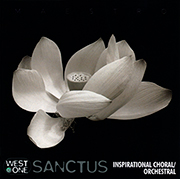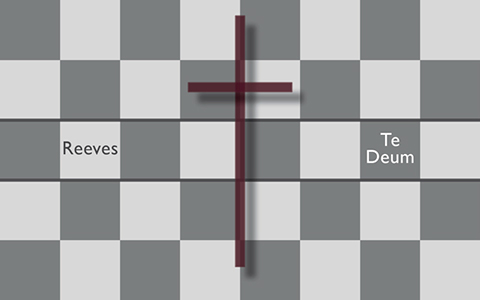Paul Reeves Music ARCHIVE
More Choral Music

Ave Maria
From Paul's West One album Sanctus.
Kyrie
The treble version, from Sanctus.
Te Deum Laudamus

A hymn for choir and orchestra commissioned by the 2009 Kingston upon Thames Festival of the Voice and performed by the Thames Philharmonic Choir at the Festival's closing concert.
The latin Hymn Te Deum Laudamus (We praise Thee, God) is attributed to Nicetas, bishop of Romania, who lived in the late fourth and early fifth centuries. Although settings of this text found a firm place in the liturgy for matins, the Te Deum also became used for general festive occasions. Inspired by the legacy of the lavishly scored versions of the past, together with the festive nature of the text, the Te Deum became the perfect starting point for Paul’s 2009 Festival of the Voice commission.
The hymn chiefly follows the outline of the Apostles Creed, but mixes a poetic version of the heavenly liturgy with its declaration of faith. From the opening fanfares and choir declamations, God is immediately named with great sense of ceremony. The next section then proceeds to name all those who praise and venerate God. The musical landscape changes to an understated and quiet march. Intimately, the choir, almost as a whisper, introduce the Apostles, Prophets and Martyrs. The choir and orchestral lines of music weave in and out of each other, which results in a jubilant climax.
The hymn then returns to it's creedal form, in a more solemn recollection of Christ's birth and his suffering. In this moment of reflection, a small group of male voices in recitative is heard, followed by a solo oboe, symbolic of God's love. At this point the text returns to the subjects declaiming the praise, both the Church in general, and the singers in particular, asking for mercy on past sins, protection from future sin, and the hoped-for reunification with the elect. Here, musical language of the fanfare combined with previously heard lines from the march, culminate to exciting effect. The hushed last line 'let me never be confounded' leaves an air of expectant hope.
The Text
We praise thee, O God: we acknowledge Thee to be the Lord.
All the earth doth worship Thee, the Father everlasting.
To Thee all Angels cry aloud: the Heavens and all the powers therein.
To Thee Cherubim and Seraphim continually do cry, Holy, Holy, Holy: Lord God of Sabaoth;
Heaven and earth are full of the Majesty of Thy Glory.
The glorious company of the Apostles praise Thee.
The godly fellowship of the Prophets praise Thee.
The noble army of Martyrs praise Thee.
The holy Church throughout all the world doth acknowledge Thee;
The Father of an infinite Majesty;
Thine honourable, true, and only Son;
Also the Holy Ghost: the Comforter.
Thou art the King of Glory, O Christ.
Thou art the everlasting Son of the Father.
When Thou tookest upon Thee to deliver man: Thou didst not abhor the Virgin's womb.
When Thou hadst overcome the sharpness of death, Thou didst open the Kingdom of Heaven to all believers.
Thou sittest at the right hand of God in the glory of the Father.
We believe that Thou shalt come to be our Judge.
We therefore pray Thee, help Thy servants whom Thou hast redeemed with Thy precious blood.
Make them to be numbered with Thy Saints in glory everlasting.
O Lord, save Thy people: and bless Thine heritage.
Govern them and lift them up for ever.
Day by day we magnify Thee; and we worship Thy Name, ever world without end.
Vouchsafe, O Lord, to keep us this day without sin.
O Lord, have mercy upon us.
O Lord, let Thy mercy lighten upon us: as our trust is in Thee.
O Lord, in Thee have I trusted: let me never be confounded.